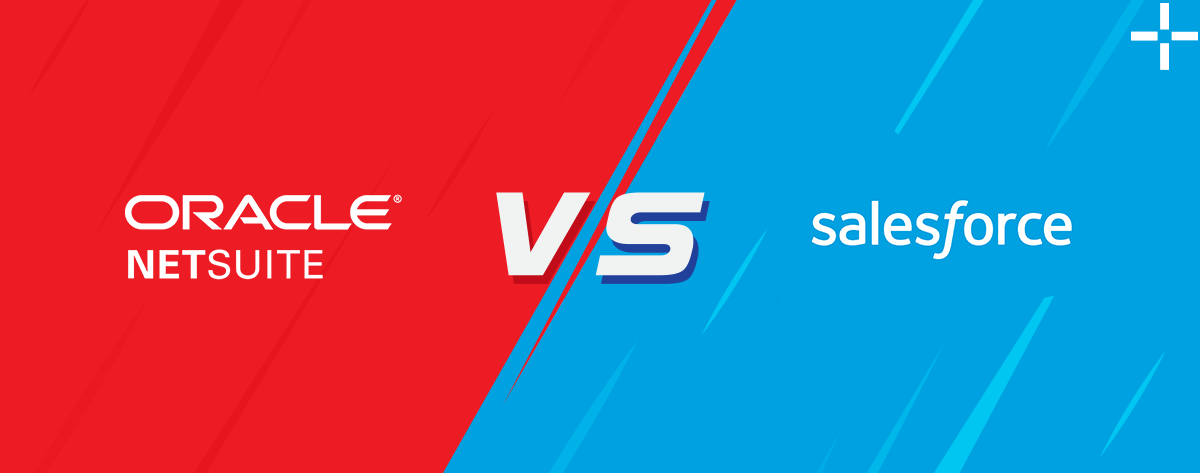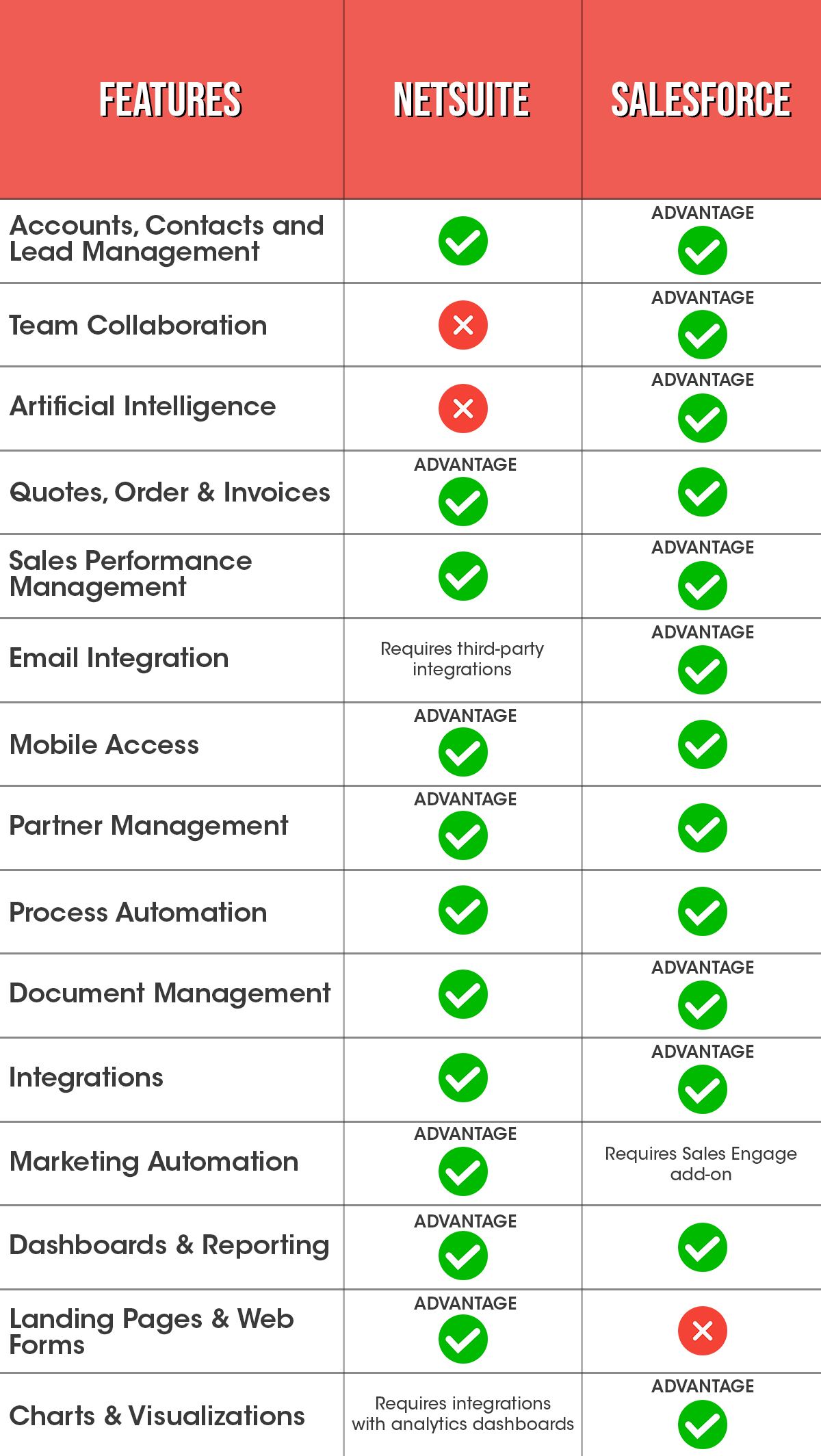
Netsuite Vs. Salesforce Comparison: Which CRM Is The Winner?
Are you researching CRM solutions to help manage customer relationships, streamline sales processes, and grow your business? Choosing the right CRM (Customer Relationship Management) system can be daunting for any business. With numerous options available, it can be challenging to decide which CRM system is the right one as per your company’s requirements. The debate between Netsuite vs. Salesforce as the superior CRM system is never-ending. Both have their own unique features, capabilities, and benefits. But which one comes out on top in this battle of CRMs?
How do you determine which one is the right choice for your organization? To determine the winner, this blog will compare Netsuite vs. Salesforce in various aspects, such as features, customization, integration, pricing, and ease of use. Whether you’re a small business owner, a sales manager, or a C-level executive, this comparison will give you all the details you need to make an informed decision. So, let’s dive in!
Netsuite Vs. Salesforce – Significance of a CRM System
Customer Relationship Management (CRM) systems are critical to a company’s success and require the right amount of time and money invested. CRM systems are vital in building and maintaining strong customer relationships, improving business operations, and driving growth and success. CRM systems are important for a variety of reasons, including:
– Improved customer engagement: CRM systems serve as a centralized repository for customer data, allowing businesses to interact with customers more personalized and efficient.
Increased sales: Businesses can identify sales opportunities, track customer behavior, and increase sales by managing customer data and interactions.
– Better customer insights: CRM systems can be used to improve products, services, and the overall customer experience by providing valuable insights into customer behavior, preferences, and feedback.
– Improved efficiency: CRM systems automate repetitive tasks, saving time for more important business activities and increasing productivity and efficiency.
– Enhanced collaboration: CRM systems provide a centralized location for teams to access and share customer information, enhancing collaboration and decision-making.
– Improved data security: CRM systems store sensitive customer data, so having a secure and reliable system in place to protect this data is critical.
Netsuite Vs. Salesforce – Which CRM Is the Winner?
It won’t be fair to declare any of these two CRMs as the winner because it depends on a business’s specific needs and requirements. Both Netsuite vs. Salesforce are well-known and widely used CRM platforms that provide distinctive features and capabilities. The best CRM is one that caters to the unique requirements of the business and promotes expansion.
Given its customization options and ease of functional integration, NetSuite unquestionably has a competitive advantage over many CRM systems currently available. Salesforce, however, argues for companies with tighter budgets. It is advised that you utilize both of the free trials that the companies provide to determine which is best for your particular business.
The Main Differences Between Netsuite Vs. Salesforce CRM
Features
Salesforce offers a wider range of features, including customer relationship management (CRM), marketing automation, analytics, and more. On the other hand, Netsuite provides integrated systems for financials, e-commerce, and HR in addition to CRM.
Customization
Salesforce is highly customizable, while Netsuite has limited customization options.
Integration
Salesforce integrates with various third-party applications, while Netsuite’s integration capabilities are limited.
Pricing
Salesforce pricing can be expensive for small businesses, while Netsuite offers more affordable pricing options for SMEs.
Ease of use
Salesforce has a user-friendly interface, while Netsuite can be complex to use.
Target audience
Salesforce is designed for larger enterprises, while Netsuite is suitable for small to mid-sized businesses.
These differences highlight that each CRM system, Netsuite vs. Salesforce, has its own strengths and weaknesses, and the selection will depend on the specific needs and budget of the business.
Netsuite – CRM System Features
Netsuite is a cloud-based CRM system that provides a suite of integrated applications for businesses, including:
1. Customer Relationship Management (CRM): Provides tools for managing customer interactions, tracking sales opportunities, and storing customer data.
2. Financial Management: Offers robust financial management capabilities, including accounting, procurement, and expense management.
3. E-Commerce: Provides an integrated e-commerce platform for managing online sales and customer orders.
4. Supply Chain Management: Offers tools for managing inventory, tracking shipments, and monitoring supplier performance.
5. Human Resources Management: It Includes HR functions such as employee record-keeping, benefits administration, and payroll management.
6. Project Management: Offers project management tools for tracking tasks, deadlines, and budgets.
7. Reporting & Analytics: Provides real-time business insights and analytics through customizable dashboards and reports.
Salesforce – CRM System Features
Salesforce is a cloud-based CRM system that offers a wide range of features for businesses, including:
1. Customer Relationship Management (CRM): Provides tools for managing customer interactions, tracking sales opportunities, and storing customer data.
2. Marketing Automation: Offers a range of marketing automation tools for creating and managing campaigns, segmenting audiences, and measuring campaign performance.
3. Sales Force Automation: Offers tools for managing sales pipelines, forecasting, and tracking performance.
4. Service & Support: Provides a platform for managing customer service requests, resolving issues, and tracking customer satisfaction.
5. Analytics & Insights: Offers real-time business insights and analytics through customizable dashboards and reports.
6. Collaboration & Productivity: Includes tools for team collaboration, document management, and task tracking.
7. Customization & Integration: It offers high levels of customization through the Salesforce AppExchange marketplace and integrates with a wide range of third-party applications.
8. Mobile App: Provides a mobile app for managing customer interactions and conducting business on the go.

Conclusion
Choosing the best CRM for your company is a difficult task. Many factors must be considered, including cost, scalability, features, and customer support. NetSuite vs. Salesforce is an all-in-one enterprise resource planning (ERP) solution that can assist businesses in managing their finances, supply chain, and customer relationships, among other things. On the other hand, Salesforce is a customer relationship management (CRM) solution that enables businesses to capture leads, track opportunities, and manage sales pipelines efficiently.
NetSuite vs. Salesforce each has its own set of advantages and disadvantages. Ultimately, choosing these two systems comes down to what you want in a CRM solution. We hope this blog has helped you decide which CRM system is best for your needs.
Also Read: How to Measure the Success of Your Digital Transformation Journey?